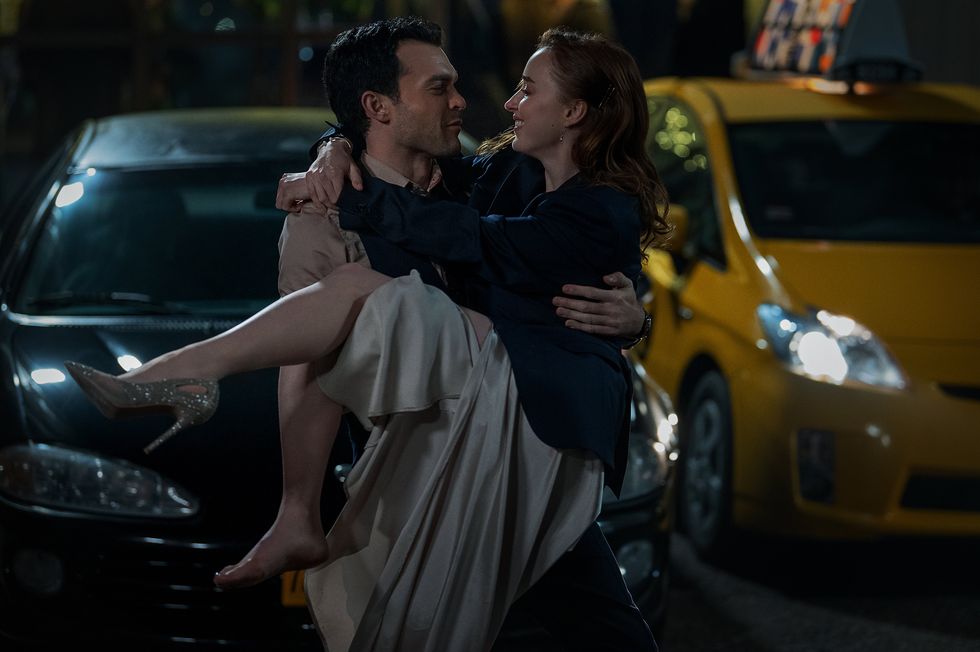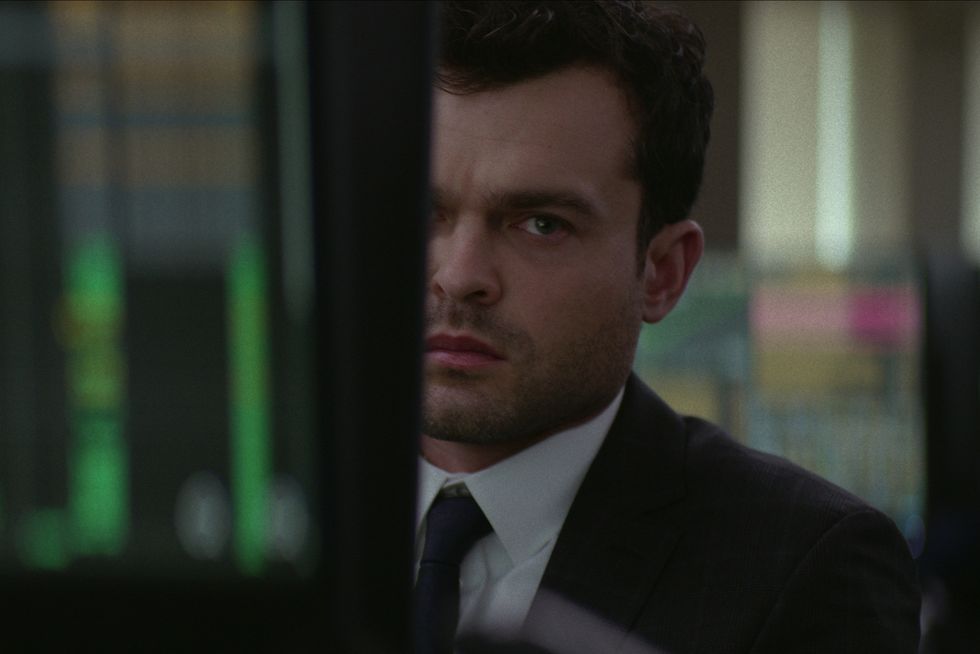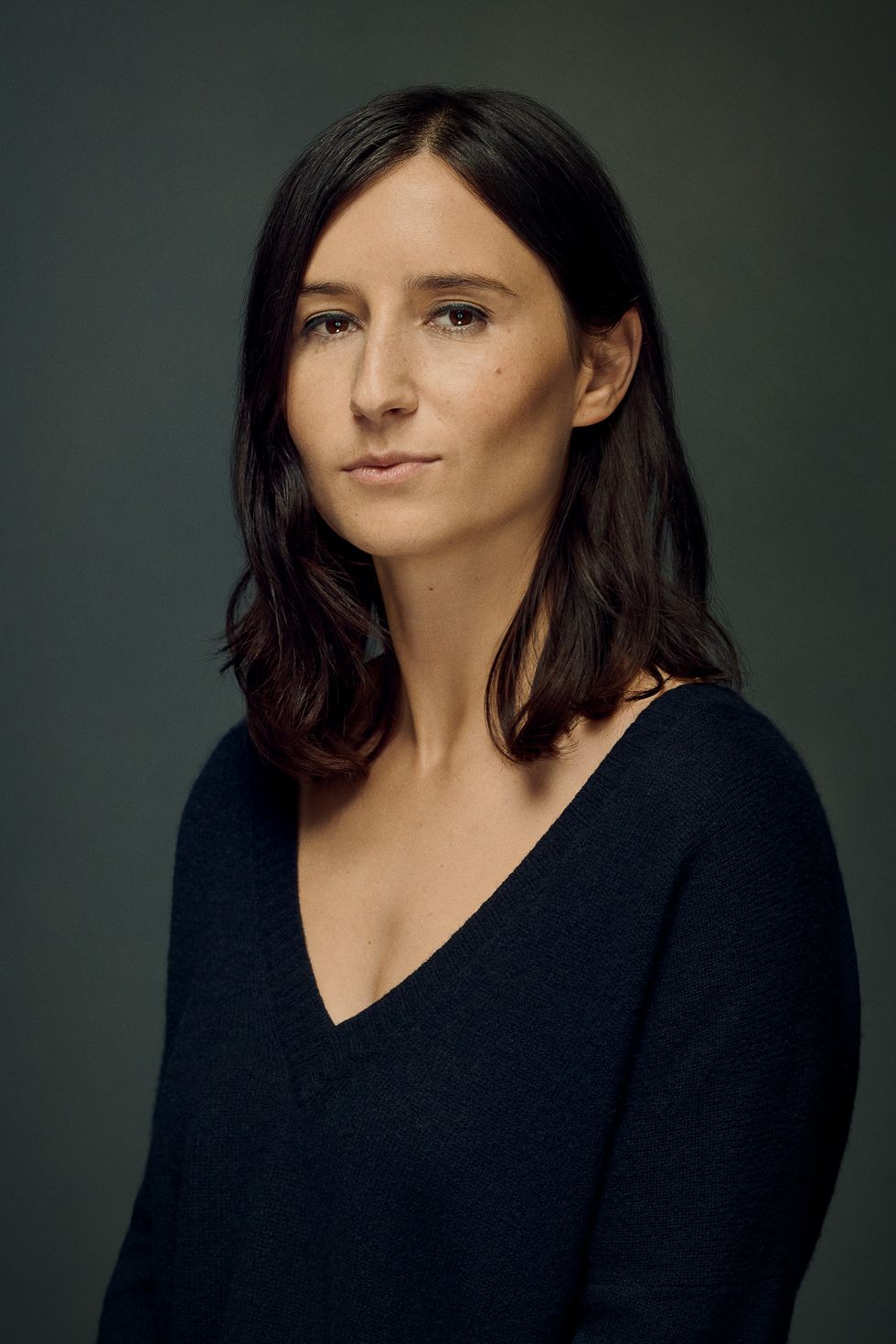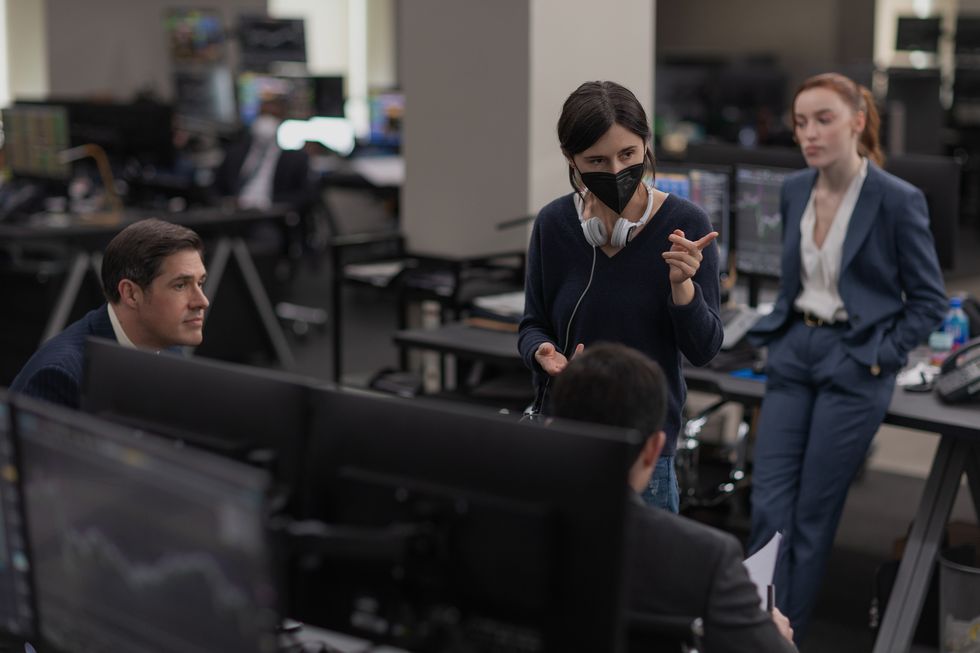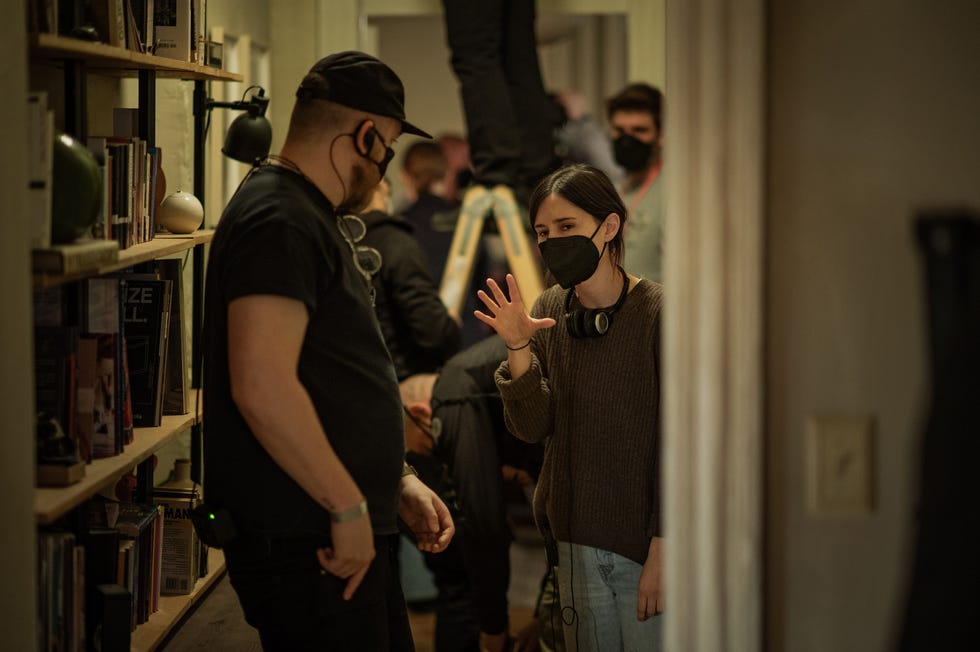Fair Play Was Always Going to End Like This
This story contains discussions of sexual assault. If you or someone you know needs support, contact the National Sexual Assault Hotline at 800-656-HOPE (4673) or visit rainn.org.
Spoilers below.
Fair Play’s first and final scenes couldn’t feel more different. The former shows two lovers in a state of careless bliss, hooking up and simultaneously getting engaged in the bathroom at someone else’s wedding; the latter has them unraveling in a fierce confrontation, one wielding a blade at the other. But in a way, the film ends the same way it begins: in blood.
More From ELLE

In the opener, Emily (Phoebe Dynevor) is on her period while her fiancé Luke (Alden Ehrenreich) performs oral sex on her. In the closer, Luke is the one who bleeds as Emily scolds him and slashes his arm with a kitchen knife. Their tense confrontation concludes with her killer last line: “Now wipe the blood off my floor, and get out. I’m done with you now.”
“It was always going to build to that moment, and it was always going to end there,” writer and director Chloe Domont tells ELLE.com. So, how exactly did we get there?
Let’s go back to the beginning: Domont wanted her lead couple to get engaged at the start of the film so viewers could see them happy and in love before things went downhill. She wondered, “What’s the most ridiculous way that a couple could get engaged?” Then she realized: “Oh, if they’re covered in blood, basically.” The result is a messy, dysfunctional, yet charmingly awkward sex scene, but the stains on Luke’s face and Emily’s dress are an omen: “What the blood represents is the violence to come, which is telling the audience, ‘Don’t get too comfortable.’”
Throughout the course of the film, Emily and Luke’s seemingly perfect romance crumbles when she gets promoted over him at their cutthroat hedge fund where, by the way, no one knows they’re dating. Luke is reluctantly congratulatory at first; he wants to be a caring, supportive partner, but his resentment grows as Emily buddies up with the guys at the office and makes big wins for the firm (further proving that she deserved the job and he didn’t), all while still dressing like “a cupcake” at work.
Luke’s snide remarks turn into slut-shaming and eventually into a full spiral that involves him showing up to work erratic and disheveled, sabotaging Emily’s career during a high-stakes meeting. Grasping any semblance of power or so-called manhood, Luke tries to keep the upper hand on Emily by using physical force: Later that night, he sexually assaults her at their engagement party in a scene that starts consensually but then becomes aggressive as she tries to resist. “That’s the only way for Luke to reclaim the power from Emily in that moment, because he’s physically stronger than her,” Domont says.
This is the last straw for Emily. When she confronts Luke at their apartment at the end of the film, she’s feeling a lot of things—pain, anger, and still, love—but decides to hold him accountable for his abuse. She finds him ready to move out and fly to San Francisco the next morning—to start his own firm. Apologizing isn’t on his list of priorities.
“Unfortunately, the only way to hold Luke accountable in that moment is to use the same physical force that he used against her,” says Domont. So, Emily grabs a knife, and makes him apologize for hurting her—professionally, emotionally, and physically. “You sit here, suddenly acting normal after terrorizing me, after cutting me down day after day, and you think that I’m just gonna let you walk out that door and act like nothing happened?” she says in disbelief.
She slices Luke’s arm and brings him to his knees, making him say “I’m nothing.” Here is when Luke finally acknowledges everything he’s done, weeping and begging for Emily’s forgiveness (“I will do anything to make it okay for you,”). But she just orders him to clean up his bloody mess and leave. In the final shot, focused on Dynevor’s face, her knife is heard clattering to the floor off-screen. The credits roll.
“For me, the ending is really about Emily reclaiming the power that Luke takes away from her when he sexually assaults her,” Domont says.
She explains, “Ultimately, I never saw this as an ending of female revenge. While there are definitely elements of female rage from the abuse that he’s put her through, for me, the whole movie really builds up to the moment where he mutters the words, ‘I’m nothing.’ That’s the moment where he finally faces his own inferiority, when he finally faces his own weakness, and his own failures. His inability to face all those things causes so much harm, and so much destruction for both of them over the course of this film. When he finally does embrace that, you see him just release everything in his body, everything that he’s been holding his whole life is just released in this moment of finally just accepting this thing that he’s been running from. For me, more than being a film about female empowerment, this is really a film about male fragility.”
Domont set out “to make a thriller about power dynamics on the ugliest level,” and she did.
As for the “wipe the blood off my floor” closing line, she wanted to give the audience “one final surprise.” And it’s true: Before she utters those words, it’s unclear what Emily will do or say to Luke, thanks to Dynevor’s layered performance. She’s not entirely consumed with rage and it seems possible she’ll lean in to kiss him.
“We’ve seen her go back to him before, and so I wanted to just tee up the audience to believe, ‘Oh my God, is she going to go back together with him again? Is this going to be a moment where they just both submit to a life of pain and dysfunction?’ As you’re sitting with that, then she undercuts him with the [line], which is, ‘No, I’m actually done with this, and I’m done with you.’ It’s almost like she holds him for the last time, and once she does that for the last time, it’s a light switch. She’s now past it, and she’s out, and that’s it.”
Even the blocking, with Luke kneeling and Emily hovering above then bending down to him, is telling. “This is a man who refuses to accept this submissive role…but as soon as she forces him into submission, that’s when he’s able to release it all.”
It would be too easy to write Luke off as solely pathetic, even if that last scene really makes him seem so, but Domont empathized with the character. Luke makes a compelling antagonist because his toxicity isn’t obvious at first; his misogyny is subtle before it grows more blatant. He’s charming and loves Emily and knows he’s supposed to root for her, but struggles when his own power is tested. He’s the kind of liberal millennial man who was raised on traditional gender roles but learned to shed them as he grew up. But still, when he feels threatened, he reverts to suppressing Emily.
“The more I leaned into Luke’s pain, I think I just realized that was the more interesting version of the film,” Domont says. “The more that Alden tapped into that pain onscreen, and the more that we saw him struggle with those two things—wanting to support her, but also wanting to get there first—the more that we saw him internalize the duality of those opposing forces, I thought that it’s the more human version of the film, and it’s the more exciting version of the film, because it’s not black and white.”
Even the fact that Luke goes down on Emily while she’s on her period is supposed to signal to us that he is a progressive guy. “I wanted to show early on that we as the audience are made to believe that this is a man who’s not threatened by a woman, because he’s literally got her blood on his face. How could he be threatened by a woman if he has her blood on his face?” Domont laughs.
That period sex scene is also notable for breaking film taboos. Domont wrote it because “it’s not something I had seen before.” She pointedly adds, “I also liked it because I knew that a man would never write this scene, so that was exciting to me, too. I am here to flip the script, and so that just felt like part of that.”
Dynevor agrees. “When you see a film like this, it really pushes you to want to create more and put more female influence out into the world. We as women know these things happen all the time, but why are we not seeing it on our screens?” she told ELLE in our October cover story.
With themes like menstruation, sexism in the workplace, apologizing for one’s success, and the emotional labor of tending to the male ego, Domont expected Fair Play to resonate with women. But it has resonated with men too.
At one screening, she saw “a group of men [aged] 60-plus just huddled in a circle, just talking about their marriages, and talking about their divorces, and talking about the way they were raised. It felt like this film unlocked something that they felt afraid to talk about.” At another screening, a man in his early 80s approached her “just so triggered by the film on so many different levels, and opening up to me about his personal experiences, and some of these dynamics. It’s incredibly gratifying.”
Domont senses that writing a nuanced story and morally gray characters might have something to do with those reactions. “I think that people really appreciate that they’re not being told, or it’s not on the nose—a lesson about feminism, or a lesson about the way men should be. It’s not telling you anything, it’s just allowing you to experience something, and at the same time, enjoy it. Ultimately, I made a film that I wanted to be entertaining.”
The director herself has enjoyed films done in a similar tone from European filmmakers like Ruben Östlund, Andrea Arnold, and the Dardenne Brothers. While Fair Play is just her feature debut (she’s previously directed episodes of Billions and Ballers), she aims to create more narratives like these in the future. “I want to continue to explore provocative shades of gray. I want to continue to tell stories that provoke, that ask tough questions, but I also want to continue to take audiences on a ride. I think there was nothing more gratifying than feeling like I had the audience on the edge of their seat for two hours.” She laughs, then continues, “I think there’s nothing more exciting than feeling like I have them by the throat.”
Dumont doesn’t just mean during the movie, but after, too. She’s very eager to see what debates Fair Play ignites, and “what relationships we can break up.” She calls it “the date movie from hell,” as a joke—but also not. “Probably not the first date, but if you’re starting to date someone, go see this movie, then have a conversation after….That can reveal a lot about a person.”
Erica Gonzales is the Senior Culture Editor at ELLE.com, where she oversees coverage on TV, movies, music, books, and more. She was previously an editor at HarpersBAZAAR.com. There is a 75 percent chance she’s listening to Lorde right now.


